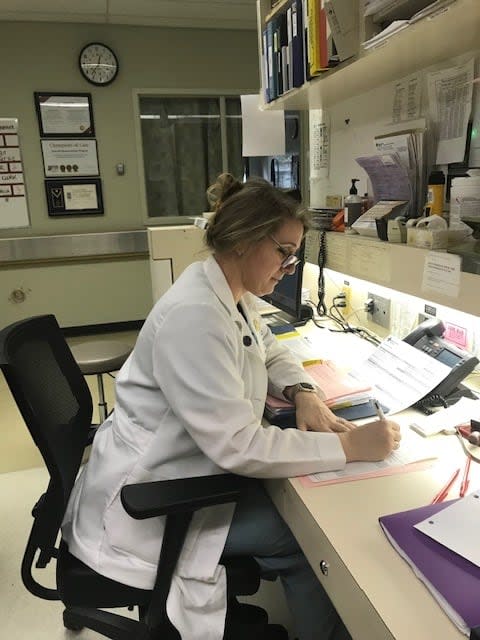Alberta's first training program for physician assistants launches in Calgary

Alberta's first training program for physician assistants, at the University of Calgary, is gearing up for an August launch, sparking hopes it could provide some relief to the province's health-care crisis.
The two-year graduate program is the only one of its kind west of Manitoba and one of just a handful of education programs for these clinicians in the country.
Physician assistants (PAs) are health-care providers who, under the supervision of a doctor, can examine, diagnose and treat patients.
The University of Calgary's application portal for the master of physician assistant studies opened a few weeks ago and already has several hundred applicants, according to Dr. Todd Anderson, dean of the Cumming School of Medicine.
"We're pretty excited about it," he said.
"For sure, Alberta Health Services is keen for us to train a number that will work in the hospitals. There's a big need there. Primary care is keen for us to train a number to work in primary care. So I think they'll be in high demand."
Funding, announced by the province last year, will allow for the enrolment of 20 students each year, said Anderson.
The idea for a homegrown training program was revived after similar plans were developed but never implemented a few years ago.
"We've been thinking about it for a number of years but really got serious in the last couple of years given the shortage of health-care providers in our province," said Anderson, adding PAs can assist physicians in a variety of settings, including hospitals, operating rooms and primary care clinics.
"They're widely used in the United States, widely used in the Department of National Defence, but less so in Canada. And everyone has recognized now that it's a growth area and something that we want to get going."
Physician assistants began practising in Alberta in 2013 through an Alberta Health Services pilot project. But they've played an extremely limited role in the health system since then.
According to the College of Physicians and Surgeons of Alberta, which regulates the profession, there were 53 PAs registered as of Dec. 31, 2023.

Kirsten Luomala, a physician assistant based in Edmonton, is president of the Canadian Association of Physician Assistants. (Submitted by Kirsten Luomala)
Funding model needed, PAs say
"This is amazing news. This is something we've been advocating for, for a long time," said Kirsten Luomala, an Edmonton-based PA and president of the Canadian Association of Physician Assistants.
"We've been not having enough training spots across the country to meet the demand for the profession, and this is just one more set of seats that hopefully we can hire and keep in Alberta."
PAs have traditionally been used in the Canadian Armed forces, she said, with the first civilian training programs established in 2008.
According to Luomala, there were 56 seats across a handful of Canadian training programs in 2023.
With the addition of the University of Calgary's program, along with a recent program launch at Dalhousie University and additional seats at other institutions, 137 PAs a year will be trained countrywide. Programs in other provinces are expected to start soon as well, said Luomala.
"So this is huge, huge growth for us," she said.
"We are clinicians. We examine patients. We take histories. We diagnose. We order tests. Very similar to residents, doctors and nurse practitioners.… We work as a team. So we are extending the reach of your physician," said Luomala, noting PAs are allowed to prescribe most medications with the exception of narcotics.
According to Luomala, physician assistants could have the biggest impact in rural family medicine.
"This is increasing access to health care. This is decreasing physician burnout. And this is decreasing wait times."
But barriers remain, she said.
What's missing in Alberta, according to Luomala, is a funding model that would allow family doctors who operate independent clinics to use physician assistants without having to pay for them out of their own pocket.
"That is going to be the biggest barrier. If we can get the government to address good funding models for family medicine clinics, then I think we'll be able to increase the numbers quite quickly."
Luomala said the association has asked to meet with the health minister to discuss the issue but has yet to hear back.
CBC News reached out to the Alberta Ministry of Health for a response but did not hear back before publication time.


